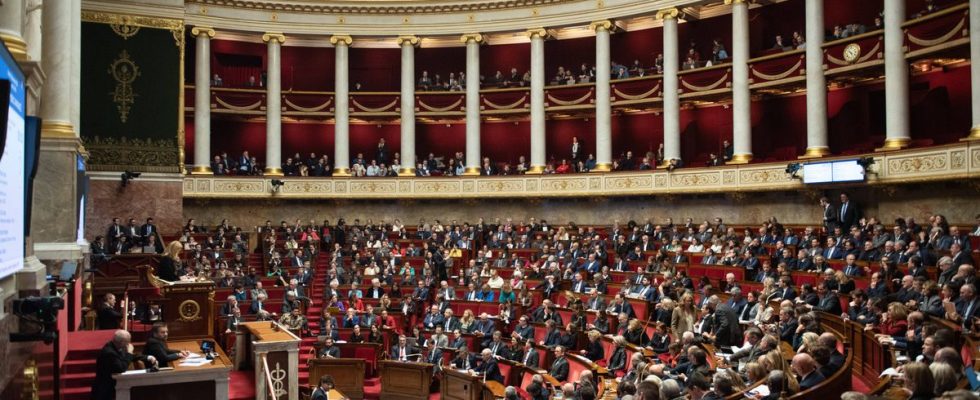To the right! It is a bill toughened by the right which was finally and definitively adopted Tuesday evening by parliament. The initial version of the immigration bill carried by Gérald Darmanin was the subject of a motion to reject last week, but, despite a modified text, the Prime Minister assures that she has “the feeling of duty accomplished” on Wednesday Morning. However, Elisabeth Borne recognized that certain provisions of the law were probably unconstitutional. But, in fact, what are these measures castigated by the left, welcomed by the extreme right and a source of unease within the majority?
A job for benefits
It’s a question that almost derailed the negotiations. The law establishes a minimum period of residence in France so that non-European foreigners in a legal situation can receive social benefits. While the right demanded a period of five years to open the right to a broad list of “non-contributory” benefits, the compromise sealed Tuesday is based on a distinction between foreigners depending on whether or not they are “in employment.” “.
For benefits such as family allowances, for the enforceable right to housing or the personalized autonomy allowance, a period of five years is thus provided for those who do not work, compared to thirty months for others. For access to Personalized Housing Assistance (APL), the main sticking point, a residence condition is set at five years for those who do not work, and only three months for others. These new restrictions do not apply to international students. Refugees or holders of a resident card are also excluded from all these measures.
Hands to the prefect for the regularization of undocumented immigrants
The majority resigned itself to a more restrictive version than that of the initial bill, giving prefects discretionary power to regularize undocumented workers in so-called shortage occupations.
This will be a one-year residence permit, issued on a case-by-case basis, provided that you have resided in France for at least three years and have been employed for at least twelve months out of the last twenty-four . This “experiment” will only apply until the end of 2026. The presidential camp only won on one point: the possibility for an undocumented worker to request this residence permit without the approval of their employer .
Migration quotas
The establishment of “quotas” set by Parliament to cap “for the next three years” the number of foreigners admitted to the territory (excluding asylum seekers) is considered unconstitutional by the presidential camp.
But the latter still agreed to integrate this measure, as well as the holding of an annual debate on immigration in Parliament, in the text of the CMP to satisfy LR… with the barely concealed hope that the Constitutional Council takes care of retouching it.
Extended loss of nationality
The presidential majority also ended up agreeing to the forfeiture of nationality for dual nationals convicted of intentional homicide against any person holding public authority.
End of automaticity of land law
Concerning the law of the soil, it conceded the end of the automaticity of obtaining French nationality at the age of majority for people born in France of foreign parents: it will now be necessary for the foreigner to request it between their 16 and 18 years old.
Another restriction obtained by the right: in the event of conviction for crimes, any naturalization of a foreign person born in France would become impossible.
Illegal stay becomes a crime again
The reinstatement of the “crime of illegal residence” was described as useless by the presidential camp. But the measure, accompanied by a fine without imprisonment, was retained. Despite the reluctance of the right, the ban on placing minor foreigners in detention appears in the final compromise.
Tightening of family reunification
The tightening of the conditions for family reunification voted by the Senate is essentially found in the final text, with in particular a length of stay for the applicant increased to twenty-four months (compared to eighteen), the need for “stable, regular and sufficient” and to have health insurance, as well as a minimum age of the spouse of 21 years (and over 18).
A deposit for foreign students
The right has obtained the establishment, except in certain specific cases, of a deposit to be deposited by foreigners requesting a “student” residence permit, aimed at covering the cost of possible “removal costs”. The Macronists had, however, fought this measure, which in their eyes constituted “a breach of equality” between students and risked weakening international students.
State medical aid safeguarded
The abolition of state medical aid (AME) for undocumented immigrants was one of the main battlehorses of the right. But the LR agreed to renounce it in this text, with the promise of a reform of the system at the beginning of 2024.
The text of the CMP, however, includes a restriction on access to the “sick foreigner” residence permit. With some exceptions, it can only be granted if there is no “appropriate treatment” in the country of origin. Coverage by health insurance will also be excluded if the applicant has resources deemed sufficient.

